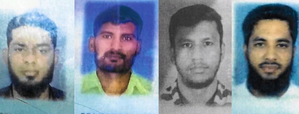Lankan intelligence authorities start fresh probe on ISIS activities after arrest of four suspects in Ahmedabad
Colombo: Sri Lankan intelligence agencies have launched a fresh probe into the ISIS activities on the island nation following the arrest of four suspected ISIS terrorists, all natives of Sri Lanka, from the Ahmedabad airport.
Sources said that Sri Lanka’s State Intelligence has requested for more details from their Indian counterparts to identify the background of arrested suspects in Ahmedabad and their alleged links to ISIS.
According to reports, the four suspects – Mohammad Nusrat (33), Mohammad Farish (35), Mohammad Nafran (27) and Mohammad Rashdeen (43) – left Colombo for Chennai a few days ago. From there, they travelled to Ahmedabad where they were arrested by the Gujarat Anti-Terrorism Squad on Monday.
The reports stated that the suspects were given a task by their Pakistani handler to carry out terror attacks in Gujarat in order to “teach a lesson” to Jews, Christians and members of the BJP and RSS.
Sri Lanka’s Public Security Minister Tiran Alles told the media that the Lankan security agencies are taking the developments quite seriously and are closely monitoring the situation.
“We are working in close coordination with our Indian counterparts to ensure that all necessary measures are taken to address any potential threat,” Alles told the media.
Five years ago, a group of Islamic State bombers carried out a series of suicide attacks in Sri Lanka on Easter Sunday, killing 270 people, including 45 foreigners, and injuring over 500.
Weeks before the coordinated bomb attacks on three churches and several hotels, the Indian intelligence agencies had alerted their Lankan counterparts about the Islamic State’s plan to carry out such suicide missions.
However, in a major security lapse, the Lankan authorities ignored the warnings.
They later admitted to receiving an “intelligence brief” from India about six terrorists planning a suicide attack on some important churches in the country.
— IANS


Comments are closed.